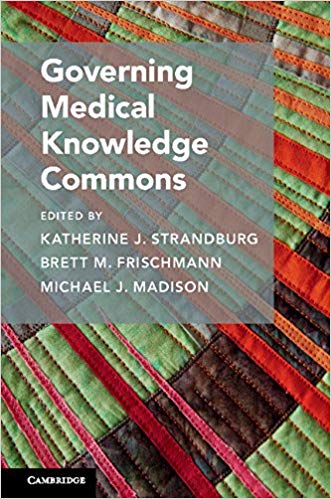A Legal Mind Takes on the Challenge of Medical Information Sharing

At Villanova Law, our faculty often pursue interdisciplinary academic projects that integrate law with other fields. A prime example is Brett Frischmann, The Charles Widger Endowed University Professor in Law, Business and Economics. He is co-authoring a series of books on knowledge commons and recently published his second book in the series, Governing Medical Knowledge Commons.
The term “knowledge commons” refers to community sharing of information, data and other types of intellectual and cultural resources, and the governance or management of this information. Examples of knowledge commons range from scientific data to Wikipedia. Knowledge in the digital form has limitless possibilities, but also requires policymaking around innovation, creative production, and intellectual property.
Along with his co-authors Katherine J. Strandburg, Alfred B. Engelberg Professor of Law at New York University School of Law and Michael J. Madison, Faculty Director of the Innovative Practice Institute and Professor of Law at the University of Pittsburgh School of Law, Frischmann’s latest book looks at how knowledge commons involving medical information can support successful and effective innovation in the medical and health fields. He makes the case that the field of medicine is rich with opportunities for knowledge commons, such as research consortiums for rare medical diseases.
In Governing Medical Knowledge Commons, Frischmann and his co-authors used a framework inspired by Nobel Prize winner Elinor Ostrom’s groundbreaking analytical and interdisciplinary social science framework on natural resource commons. The book features 15 case studies in which researchers, medical professionals and patients share innovations, information and knowledge resources in order to make progress in the field.
“Medicine is an area where there’s lots of data and there’s lots of knowledge,” said Frischmann. “Right now, all around the world, everyone is trying to figure out how to pool medical data so that you can do and share research in a number of areas.”
One issue that arises is privacy. He explains, “Medical knowledge commons often rely heavily on patient data, and that means you have to deal with privacy. Developing trusted systems for collecting, curating and managing pools of patient data requires institutions, or as lawyers often like to say, governance.”
Frischmann recognizes that it is not every day that a legal professional takes on sophisticated social scientific research. “It’s different for lawyers to be doing this,” he says. “But lawyers are basically institutional engineers. We learn how to write laws and build contracts, creating the legal structures that help people collaborate and solve problems. It makes sense that law professors are interested in knowledge commons, but the methodology is not our normal research practice. There’s a lot of demand for learning lessons in this area.”
Long-term, he hopes to continue applying this framework to more case studies and begin meta-analysis that will identify patterns that transcend fields and categories and generate new overall design principles for knowledge commons.
This fall, Frischmann hosted a conference at Villanova Law on knowledge commons. “Governing Privacy in Knowledge Commons” brought together renowned scholars from around the country to offer free-flowing discussion and to ignite new ideas and proposals for this 21st century challenge. The conference will eventually culminate in published final papers in a book by Cambridge University Press.

